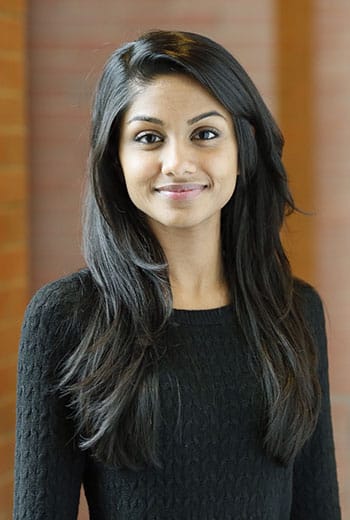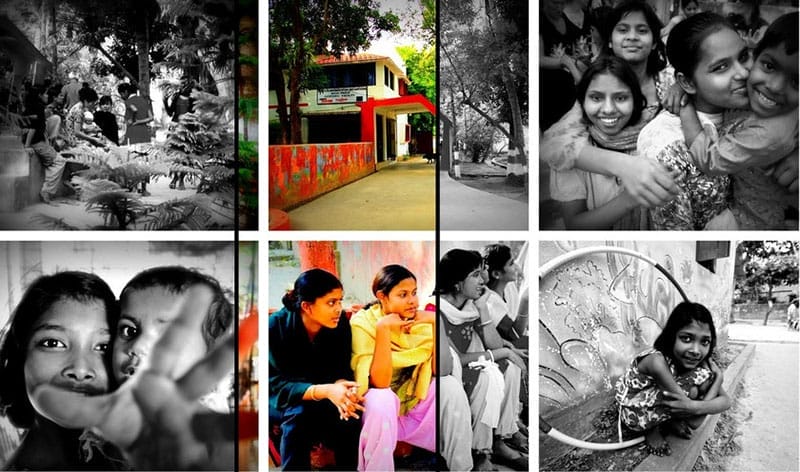More slaves exist today than ever in history. At least 30 million. An estimated 14 million in India alone. Around the world, a new person becomes a victim of human trafficking every 30 seconds. About 99 percent of them are never rescued.
Those are the numbers and the odds that second-year Wharton MBA Sindhura Sarikonda is working to overcome with Sanlaap North America (SNA).
She started on her mission seven years ago, as she sat in her dorm room as a junior at New York University watching a movie, like many students do in their free time. This movie, The Day My God Died, about human trafficking in India, inspired her to act. Before her summer internship on Wall Street, she went to India to learn more about trafficking. When she returned, she felt compelled to do something to make a difference. In 2010, she partnered with a nonprofit called Sanlaap India and formed her own, called Sanlaap North America. She secured her first grant of $100,000 to build a shelter in Kolkata for women to escape their bondage from brothels in India, Nepal and Myanmar.
Sarikonda proceeded with her very direct approach for the next several years, but she realized she needed to make a couple of changes. For one, she was doing it part time since she was working as a consultant at her day job. She grew determined to commit full time. She also realized that although girls found solace in SNA’s shelters, once they left, they had no marketable skills, nothing to help lift them above the life they ran away from in the first place.

Second-year Wharton MBA Sindhura Sarikonda
To address the latter issue, Sanlaap North America has expanded its program to include not just safety and rehabilitation, but education, training and employment. It trains girls to make home goods and crafts, for instance, through Zesa, the SNA arm that focuses on education, employment and retail. More than 1,200 girls have gone through the program. The overall goal has become to address the “extreme, devastating poverty” that’s at the root of much of the girls’ predicaments, by providing marketable skills for human trafficking survivors and to provide education and employment to at-risk girls.
“I realized a few years ago that our rescue and shelter efforts weren’t moving the needle on trafficking, so we mined all the data we had on trafficking and isolated specific communities that are at highest risk,” Sarikonda says. “The girls in these communities are sold by their families, living in extreme poverty, for between $80 and $120. These are the communities in which Zesa is most active, with the intent of reducing trafficking by economically empowering girls and changing the perception of girls from being a burden to the family to being an income earning member of the family.”
Zesa and Sanlaap North America have earned distinction for their efforts. In the 2014 Annual Classy Awards, put on in partnership with the United Nations Foundation, SNA was named a top 5 child rights nonprofit. The Kellogg School of Management’s Charity Auction Ball selected it as its international charity of the year for 2014. And in 2015, Sarikonda earned the second-annual CommonBond Social Impact Award, which recognizes the nation’s top MBA social entrepreneur with a $10,000 award.
As that latter award hints, Sarikonda’s full-time efforts with the social enterprise are on hold as she is a second-year student in Wharton’s MBA Program. She says she came to understand that she was able to get Sanlaap North America off the ground in the first place because of her undergraduate business education and that she needed to learn more—to hone her methodology and gain the knowledge to scale her social impact efforts—with the goal of going social impact full time. It was during her MBA summer earlier this year, after all, that Sarikonda for the first time worked full time with Sanlaap North America’s 34 employees, eight U.S. volunteers, 1,000 donors and four partner organizations.
“Wharton is underrated in the social impact space,” she says, adding how she has noticed a growing interest on campus in social entrepreneurship and innovation even just in the one and a half years she has been in Philadelphia.
And yes, when she completes her degree in 2016, Sarikonda will commit herself.
“It’s something that I feel very passionate about,” she says of social impact. “Something I would not give up unless I absolutely had to.”


























